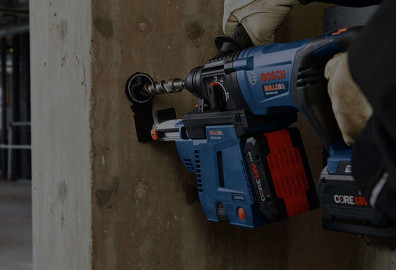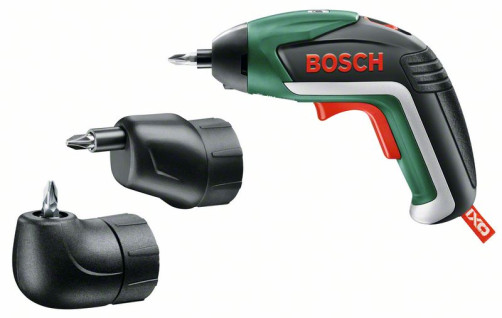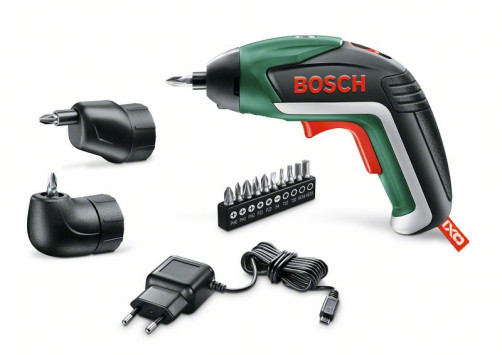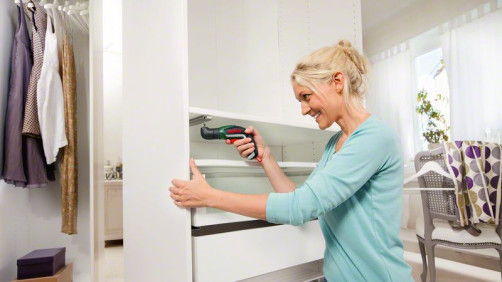Cordless screwdriver with lithium-ion battery IXO Full Set - with angular and eccentric nozzles
Description
Brief description of the product
- Compact station wagon from Bosch
The main characteristics of the product
- Ergonomic handle shape with multiple grip positions
- Powerful LED Power LED for spot or diffuse lighting
- microUSB charger for convenient portable charging
- Easy assembly and disassembly of furniture, quick screwing or unscrewing of screws
- Lithium-ion technology: no memory effect or battery self-discharge
Usage level
- Easy
Comparative scale
- Cordless screwdriver with lithium-ion battery IXO Full Set — with angular and eccentric nozzles
Scope of delivery
- Eccentric nozzle (1 600 A00 1YA)
- USB Charger
- Corner nozzle (1 600 A00 1Y8)
- 10 standard bits
Characteristics
General Specifications
Dimensions of packaged product
Specifications
- A nickel-cadmium battery (NiCd) is a type of rechargeable battery with electrodes made of nickel hydroxide and cadmium metal. Such batteries have a higher energy density than lead-acid batteries, better charge and discharge characteristics, and resistance to external influences.
- Lithium-ion battery (Li-ion) is the most common type of rechargeable batteries after lead-acid batteries according to world estimates in recent years. Intercalated lithium compounds are used as electrodes. Hence, there are many varieties of electrochemical systems in Li-ion from cobalt to titanate.They have the highest energy density, high specific power and low self-discharge rate during storage. There is no conventionally called "memory effect" (they do not need to be "trained", unless in case of problems with the display, it is calibrated, not the battery).
- Lead-acid battery is one of the oldest and most widely used types of rechargeable batteries. Electrodes made of lead dioxide and lead metal immersed in a sulfuric acid electrolyte. The main disadvantage is a short service life, a low energy—to-weight-to-volume ratio, you need to monitor the electrolyte and the condition of the plates, you can not discharge completely. But it is inexpensive to produce, an affordable price for the consumer. It works reliably for the prescribed (albeit short) period.Such batteries are used for car starters, uninterruptible power supplies and large-scale energy storage devices.
- A nickel-cadmium battery (NiCd) is a type of rechargeable battery with electrodes made of nickel hydroxide and cadmium metal. Such batteries have a higher energy density than lead-acid batteries, better charge and discharge characteristics, and resistance to external influences.
- Lithium-ion battery (Li-ion) is the most common type of rechargeable batteries after lead-acid batteries according to world estimates in recent years. Intercalated lithium compounds are used as electrodes. Hence, there are many varieties of electrochemical systems in Li-ion from cobalt to titanate.They have the highest energy density, high specific power and low self-discharge rate during storage. There is no conventionally called "memory effect" (they do not need to be "trained", unless in case of problems with the display, it is calibrated, not the battery).
- Lead-acid battery is one of the oldest and most widely used types of rechargeable batteries. Electrodes made of lead dioxide and lead metal immersed in a sulfuric acid electrolyte. The main disadvantage is a short service life, a low energy—to-weight-to-volume ratio, you need to monitor the electrolyte and the condition of the plates, you can not discharge completely. But it is inexpensive to produce, an affordable price for the consumer. It works reliably for the prescribed (albeit short) period.Such batteries are used for car starters, uninterruptible power supplies and large-scale energy storage devices.
The battery capacity is the maximum amount of electrical energy that is accumulated by a given battery or rechargeable battery in one complete charging cycle.
This value shows how long a battery device with a certain level of current consumption connected to this energy storage device will work during one discharge cycle.
The unit of measurement of electrical capacity is ampere-hour (A·h or A·h).The battery capacity is the maximum amount of electrical energy that is accumulated by a given battery or rechargeable battery in one complete charging cycle.
This value shows how long a battery device with a certain level of current consumption connected to this energy storage device will work during one discharge cycle.
The unit of measurement of electrical capacity is ampere-hour (A·h or A·h).Additional characteristics
Terms of delivery
Who provides the delivery of goods?
On the Enex marketplace, you order the product directly from its supplier, and Enex employees organize the delivery in the way you choose.What are the delivery methods?
You can choose any convenient way for you to receive an order:-
Pickup from partner locations or from the manufacturer's warehouse
If the manufacturer or trading company has the possibility of pickup, you can pick up your goods yourself or use the services of any transport company. Pickup is free of charge. -
Delivery to the terminal by a transport company
Pick up the goods at the nearest terminal of the Business Lines shopping center or DHL in your city. The delivery time and cost depend on your region and the dimensions of the cargo - they will be known at the stage of ordering. -
Delivery to the door by courier of the transport company
Receive the goods at your address via a Business Lines courier or DHL. The delivery time and cost depend on the region and the dimensions of the cargo - they will be known at the stage of ordering.
How can I keep track of the shipped product?
After you have selected your preferred delivery method and placed an order, you will be able to monitor the change in its status by the number in your personal account, and track the immediate location of the product by the track assigned by the delivery service. You will also receive email notifications about changes in the status of your order. This way, you will always know where your product is located and respond promptly to changes.Payment methods
Payment by bank card online
You can pay for the goods with bank cards "Visa", "Master Card", "Mir", "JCB". Payment by bank card is made without commission.- your bank card number;
- expiration date of your bank card;
- CVV code for Visa / CVC code for Master Card: the last 3 digits on the signature strip on the back of the card;
- confirm the card transaction, for example, with a one-time password from an SMS.
Payment according to the invoice
On the checkout page, select the “Invoice payment” option, and after placing the order, the system will automatically generate and send you an invoice for payment to the specified email address.Payment with bonuses
The buyer can pay part of the order cost (up to 20%) with Enex bonuses. The procedure and conditions for calculating and debiting bonuses are specified in section 7 Rules of sale and delivery.The seller's indication on the marketplace
Various suppliers of tools and equipment trade on the Enex marketplace. These can be both manufacturers and trading companies. In this case, the Marketplace acts as an agent (Chapter 52 of the Civil Code of the Russian Federation). Enex itself can also act as a seller for some products. Learn more about ordering from different suppliers.Return of goods
Is it possible to return the purchased product?
If you are not satisfied with the product purchased on the Enex platform, you can return it or exchange it under the conditions specified below. Since buyers conclude direct purchase and sale transactions with manufacturers on the Enex platform, the return of goods is carried out directly to manufacturers.
Return of goods of proper quality
For individuals
The buyer-an individual has the right to refuse the ordered goods at any time before receiving it, as well as after receiving the goods - within 7 days, not counting the day of purchase. The return of the goods is possible if its presentation and consumer properties are preserved, as well as a document confirming the fact and conditions of purchase of the goods.
The buyer does not have the right to refuse a product of proper quality having individually defined properties if the specified product can be used exclusively by the buyer acquiring it.
In case of refusal of the goods of proper quality, the cost of services for the organization of delivery to the buyer is not refunded. Transportation costs for the return of goods of proper quality are borne by the buyer. The method of returning the goods is determined by the buyer.
For legal entities
The return (exchange) of goods of proper quality by the buyer, who is a legal entity (individual entrepreneur), is not allowed, unless otherwise provided by the agreement with the supplier.
Return of goods of inadequate quality
For individuals
The buyer, who is an individual, in cases provided for by law, may return the goods of inadequate quality during the warranty period for the goods and demand a refund of the amount of money paid for the goods. The goods of inadequate quality, in agreement with the buyer, can be replaced with a similar product of proper quality.
For legal entities
The buyer, who is a legal entity (individual entrepreneur), in the event of the transfer of Goods of inadequate quality to him, has the right to make claims provided for in Article 475 of the Civil Code of the Russian Federation.
Distribution of responsibility
In case of return/replacement of low-quality goods, the cost of delivery of the goods is paid by the supplier. The supplier reserves the right to accept the goods of inadequate quality from the buyer and, if necessary, to check the quality of the goods. If, as a result of the examination of the goods, it is established that its shortcomings arose due to circumstances for which the supplier is not responsible, the buyer is obliged to reimburse the supplier for the costs of conducting the examination, as well as the costs associated with its storage and transportation of the goods.
If any defect is found in the product, the manufacturer and (or) the marketplace has the right to require the buyer to provide a photo of the product, the claimed defect, packaging, labeling (nameplate) of the manufacturer.
If the buyer, who is a legal entity (individual entrepreneur), refuses the goods of inadequate quality, such buyer is obliged to return such goods to the supplier. The buyer - an individual can also return the goods to the address of the supplier or Marketplace.
Transportation costs for the return of low-quality goods are borne by the supplier or Marketplace.
The difference between the shades of the goods in the photo and the real goods is not a sign of poor quality.
For questions about the return or exchange of goods, please contact us by phone 8 800 707-56-00 or by email: info@enex.market .


















